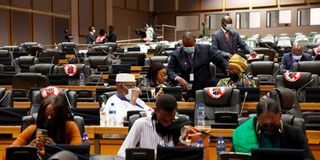Toothless Pan-African Parliament cries out over stalled Malabo Protocol

Pan-African Parliament members sit inside the house following its postponement in Johannesburg, South Africa, on June 1, 2021. The House has failed to deliver on its mandate. PHOTO | PHIL MAGAKOE | AFP
What you need to know:
- The 2014 Malabo protocol, which is intended to expand the powers of the institution into a fully fledged legislative organ, is yet to be signed and ratified by the AU because member states have deliberately been dragging their feet.
- At least 28 AU member states are required to ratify the protocol before it becomes operational but so far only 22 have signed it.
- Additionally, only 14 have ratified the agreement and Kenya is not among them.
Johannesburg
When he presided over the inauguration of the Pan African Parliament (PAP) and swore in 202 legislators from 41 countries in Africa on March 18, 2004, Mozambican President Joaquim Chissano, who was then African Union chairman, is quoted by the United Nations Africa Renewal publication having said, “there’s great hope and expectation pinned on the establishment of the Pan-African Parliament” and that “the whole world shall be watching to see what added value this organ is going to contribute to our plan of building a strong and prosperous African Union.”
It is 18 years later and the continental Parliament remains toothless and deflated quite literally. It has failed the test of its own existence.
AU Chairperson Macky Sall recently described performance of the continental House as “below expectation” owing to the fact that the existence of the institution remains unknown across Africa.
According to newly elected President of the continental legislature Chief Fortune Charumbira from Zimbabwe, PAP “has not been allowed by the very African Union to execute its functions.”
The 2014 Malabo protocol, which is intended to expand the powers of the institution into a fully fledged legislative organ, is yet to be signed and ratified by the AU because member states have deliberately been dragging their feet.
At least 28 AU member states are required to ratify the protocol before it becomes operational but so far only 22 have signed it.
Additionally, only 14 have ratified the agreement and Kenya is not among them.
Mr Charumbira describes the situation as pathetic and deplorable, calling upon both the AU and African Union Commission to ensure there is political goodwill that will see the dreams and aspirations of the continental Parliament realized, just like other protocols.
“African Continental Free Trade was ratified by 33 countries within 48 hours yet for PAP no implementation eight years down the line?” Says Charumbira.
The Africa Continental Free Trade Area (AfCFTA) deal, which created the largest free trade area in the world, was struck by the AU and signed by 44 of its 55 member states in Kigali on March 12, 2018.
Currently, the continental Parliament, which is the third organ hierarchically after the AU and AU Commission, only plays the consultative and advisory roles and the 2014 Malabo Protocol sought to expand its mandate by adding the legislative role.
According to its president, the move to deny or slow down ratification of the protocol is by design because the AU is not keen on accountability on all fronts.
Whereas all the 55 member states allocate financial resources to the union, no arm scrutinises the expenditure because AU’s budget is not sent to PAP.
“AU deliberately subverts transparency and accountability to ensure they escape accountability.”
A retreat between the parliament and Permanent Representatives Committee of the AU has been planned and Mr Charumbira says it will be a make-or-break session since PAP will be settling for, among other things, acceptable financial allocation and ratification of the 2014 protocol.
Fourteen countries have signed and ratified the agreement adopted at the AU Assembly of Heads of State and Government meeting in June 2014 in Equatorial Guinea.
They include Benin, Chad, Equatorial Guinea, Gambia, Ghana, Madagascar, Mali, Morocco, Niger, Sahrawi Arab Democratic Republic, Sierra Leone, Somalia and Togo.
The Pan-African Parliament, based in Midrand, Johannesburg, sits for five years before new members replace country representatives.
Kenya’s latest five representatives were Beatrice Kones, Janet Ongera, Dr Abdullahi Ali, Jude Njomo and Stewart Madzayo.
The aim of its establishment was to create space where people from all states in Africa could meet, deliberate and pass some policy issues that impact the continent as a whole.





